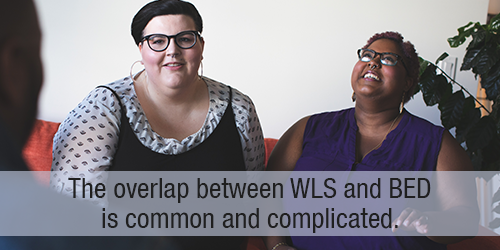The connection between binge eating disorder and bariatric surgery is complex and unclear. Stay with me here… Many people in large bodies (actually people in all size bodies!) attempt to change their body size with restrictive methods, including various diets and programs. Restrictive eating is a risk factor for binge eating. Some people who binge eat live in a large body (though certainly not all). Some people in large bodies seek bariatric surgery, and some of those have BED. Some people with BED and higher weight are unfortunately referred for bariatric surgery instead of treatment for binge eating.
Further, since people who have had bariatric surgery are typically advised to follow a restricted eating plan, they may be prone to binge eating. And finally, bariatric surgery does not address the underlying drivers for binge eating and binge eating may increase the complications after bariatric surgery.
In this post, we’ll explore the complex topic of binge eating and bariatric surgery with a small group of real people who had both.
BED and WLS
During one of our Am I Hungry? Mindful Eating for Binge Eating Retreats, it became clear how common the overlap of binge eating and bariatric surgery is. Five of the retreat participants (more than a third!) struggling with binge eating had already had bariatric surgery (weight loss surgery or WLS).
 I asked if they would be willing to sit down with me and talk about their experiences. They all enthusiastically consented, saying they hoped it would help other people who were struggling with binge eating disorder (BED) after bariatric surgery. (However, this is a stock photo since I did not ask for permission to share their photos.)
I asked if they would be willing to sit down with me and talk about their experiences. They all enthusiastically consented, saying they hoped it would help other people who were struggling with binge eating disorder (BED) after bariatric surgery. (However, this is a stock photo since I did not ask for permission to share their photos.)
In our small sample size, there were several interesting findings about BED after WLS:
- They were all at least two years out from their weight loss surgeries. (We are less likely to see people during the “honeymoon” period after bariatric surgery when it seems all is well.)
- They had had a variety of procedures: Roux-en-Y gastric bypass, gastric sleeve, and adjustable gastric band. One of them had a band that was later converted to a sleeve.
- They all said they had symptoms of binge eating disorder prior to their procedures.
- They had hoped bariatric surgery would “fix” their problem but it hadn’t. That’s why they had decided to do the Am I Hungry? Mindful Eating for Binge Eating Program.
Let me first share some of the things they told me (anonymously but with their permission of course). Their comments provide a lot of insight into the complexity of BED and WLS. After that, I’ll talk about my take-aways from working with them during the retreat.
Observations about Bariatric Surgery and Binge Eating
“I was never diagnosed with Binge Eating Disorder prior to the surgery. But I had it.”
“I’ve always felt that I was missing something. Something must be wrong with me—was I missing willpower? I am very successful in my work though, so I figured there had to be another answer.”
“I’ve been on a diet my whole life and that never cured my binge eating! Having surgery was just another diet.”
“I’ve been going to the yearly follow-up but I’ve been gradually regaining weight.”
“My surgery team told me the surgery was only a tool but I didn’t want to listen. They kept saying ‘You have to make changes,’ but they don’t tell you how to make changes.”
“I took an Am I Hungry? Mindful Eating Workshop before surgery so my expectations were more realistic.”
“I’m glad I had the surgery; it allowed me to become more active, which I love. Now I need to deal with my binge eating disorder.”
“I had been going to support groups for two years but all they do is support you. They didn’t actually tell us how to heal our relationship with food.”
“The procedure was effective for weight loss, but now I am medical care-dependent.”
“Until I learned mindful eating, I still wasn’t free of my issues with food!”
“I don’t regret having the surgery. I had the lab work of a 70 year-old woman. I had a Lap Band in 2009. I lost 40 pounds on a diet so I could have the surgery, then I lost 100 pounds after surgery. I have regained 40 pounds so far, so I am here to finally address my binge eating.”
“I always eat – I’m never hungry, never full.”
“I was told that if you eat too much too fast, the food will get stuck. That’s all I had learned about mindful eating until now.”
“Since my surgery, I eat to throw up.”
“I had the band. I could eat a Snickers bar, but not protein so I just stick to “slider” foods or “cheater” foods.”
“My mother had weight loss surgery too and only ate junk food afterward. That isn’t healthy either and I don’t want it to be like that.”
“I am seeing a therapist now.”
My take-aways about binge eating and bariatric surgery
I loved working with these individuals because they were obviously highly motivated to get better. After all, they had even had a surgical procedure to try to stop binge eating. Having already gone through bariatric surgery, they clearly understood that binge eating wasn’t going to be fixed by one more diet. (Listen to Jenn’s Story: Learning to love herself.)
Most were glad they’d had bariatric surgery but were disappointed and even surprised that it hadn’t stopped them from binge eating. As we explore in the Am I Hungry? Mindful Eating for Bariatric Surgery program, maladaptive eating is a common challenge for people after weight loss surgery and can lead to complications and weight regain.
Unfortunately, too many people (and health care professionals) think the problem is weight and miss the diagnosis of BED, or prescribe the wrong treatment: weight loss. (Be sure to read this post too: What is the Association Between Weight and Binge Eating Disorder?) Ultimately, it is essential to resolve the underlying issues driving the binge eating.
During the retreat, these participants learned that it wasn’t about the food or about having enough willpower. They learned to tell the difference between meeting their needs for fuel and meeting their other needs. Together, we had many lovely mindful meals and mindful movement opportunities. I am happy to say that they are now on the right track toward healing their relationship with food and their body!
This article has been updated from a previously published version.
If you enjoyed this article, here are three more to help you:
Mindless and Emotional Eating after Bariatric Surgery
Symptoms of maladaptive eating after bariatric surgery
What is the Association Between Weight and Binge Eating Disorder?


4 thoughts on “Binge Eating and Bariatric Surgery”
This surprises me. I enjoy the mindful eating program and have had bariatric surgery as well. I literally can not binge eat anymore. I used to eat so much–example: 3 slices of pizza followed by chips then a frosting filled sandwich cookie from the mall. That was typical. No way is that possible now! The surgery literally saved my life.
Thanks for sharing CB. I’m so glad you are doing well! Remember that this is a group of people who came to our Binge Eating Retreat so they probably don’t represent the average so I appreciate you adding your perspective. Do you mind sharing what type of procedure you had and how long ago?
I have had gastric sleeve surgery as of two months ago. I have lost 45 pounds thus far. However, I cannot stop the evening binge eating. I can eat a lot of food in one sitting, but not all food. Meats and breads are really hard on my stomach. But soft foods and small foods (rice for example) I can put a lot away. I often joke it’s like I didn’t have the surgery at all because my friends and family are amazed at how much I can eat and not feel uncomfortable. It’s a private shame I feel and truly wish I could be rid of his binge eating curse. I don’t want to waste this golden opportunity I have been given.
Thank you for writing. I’m sorry you are struggling. You’re not alone! Please listen to Jenn’s story in the Personal Stories section. Please also click on Programs > Mindful Eating for Binge Eating > Get Started for resources that will help you. Please also seek counseling from an Eating Disorder therapist who has training in bariatric surgery. You have a self-care voice that can be nurtured and that will guide you toward the life you crave.
Comments are closed.